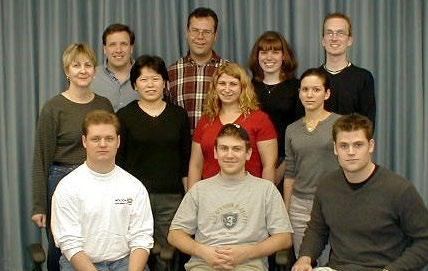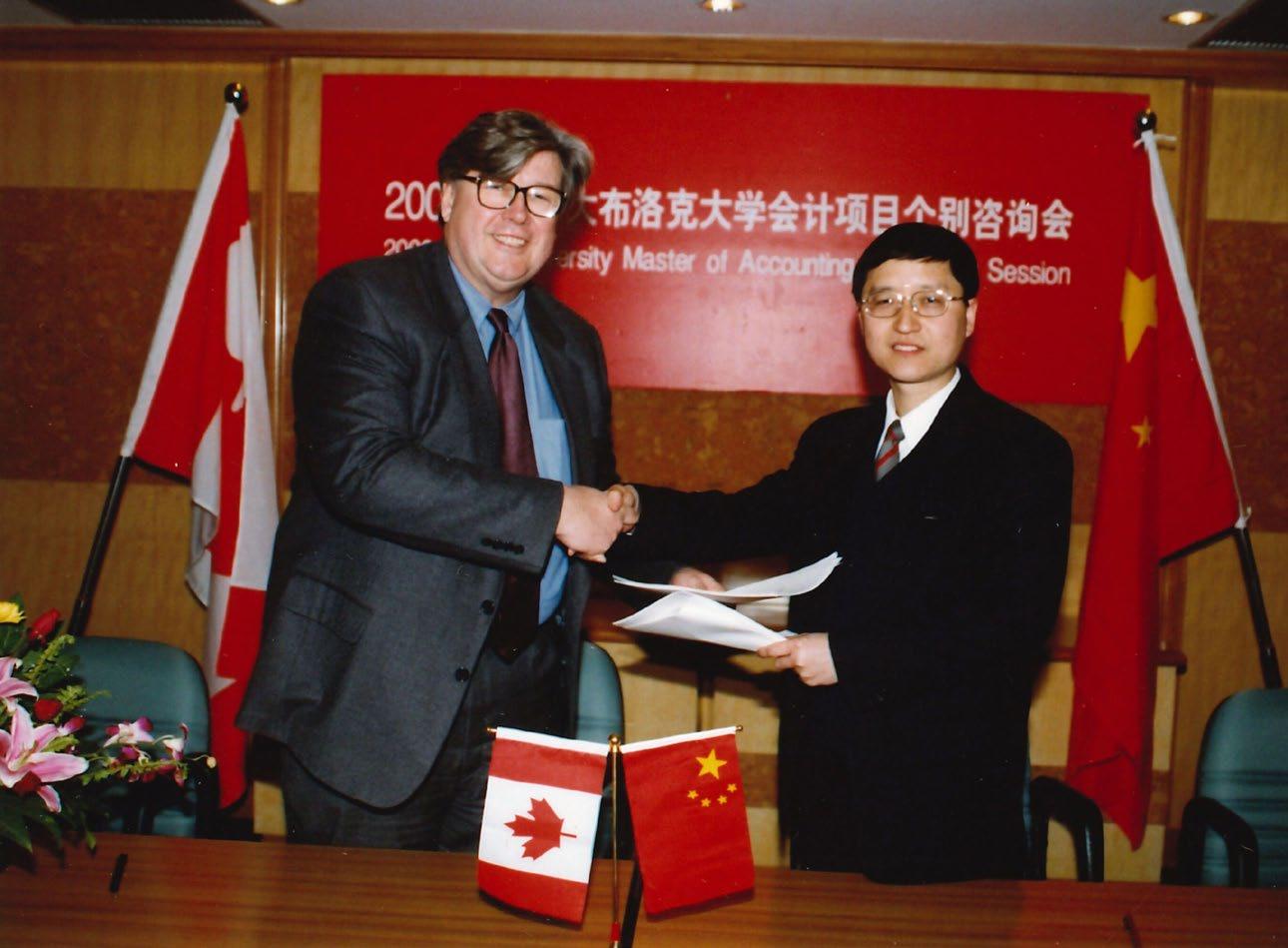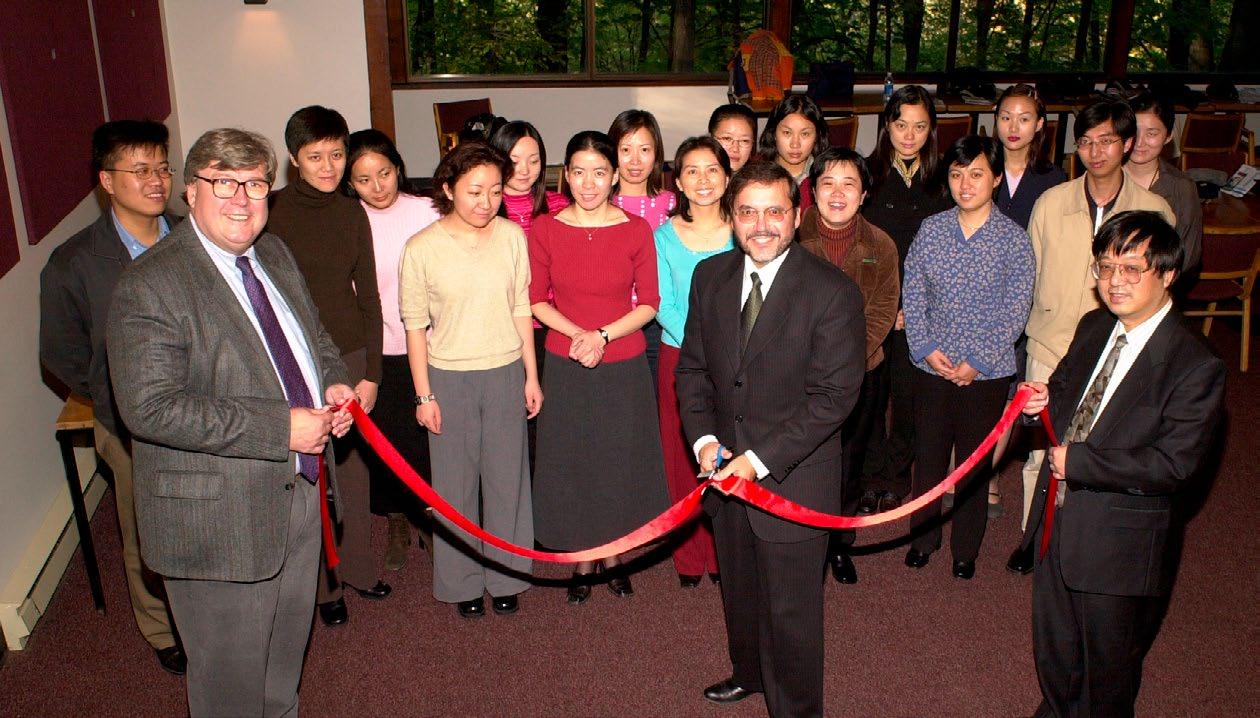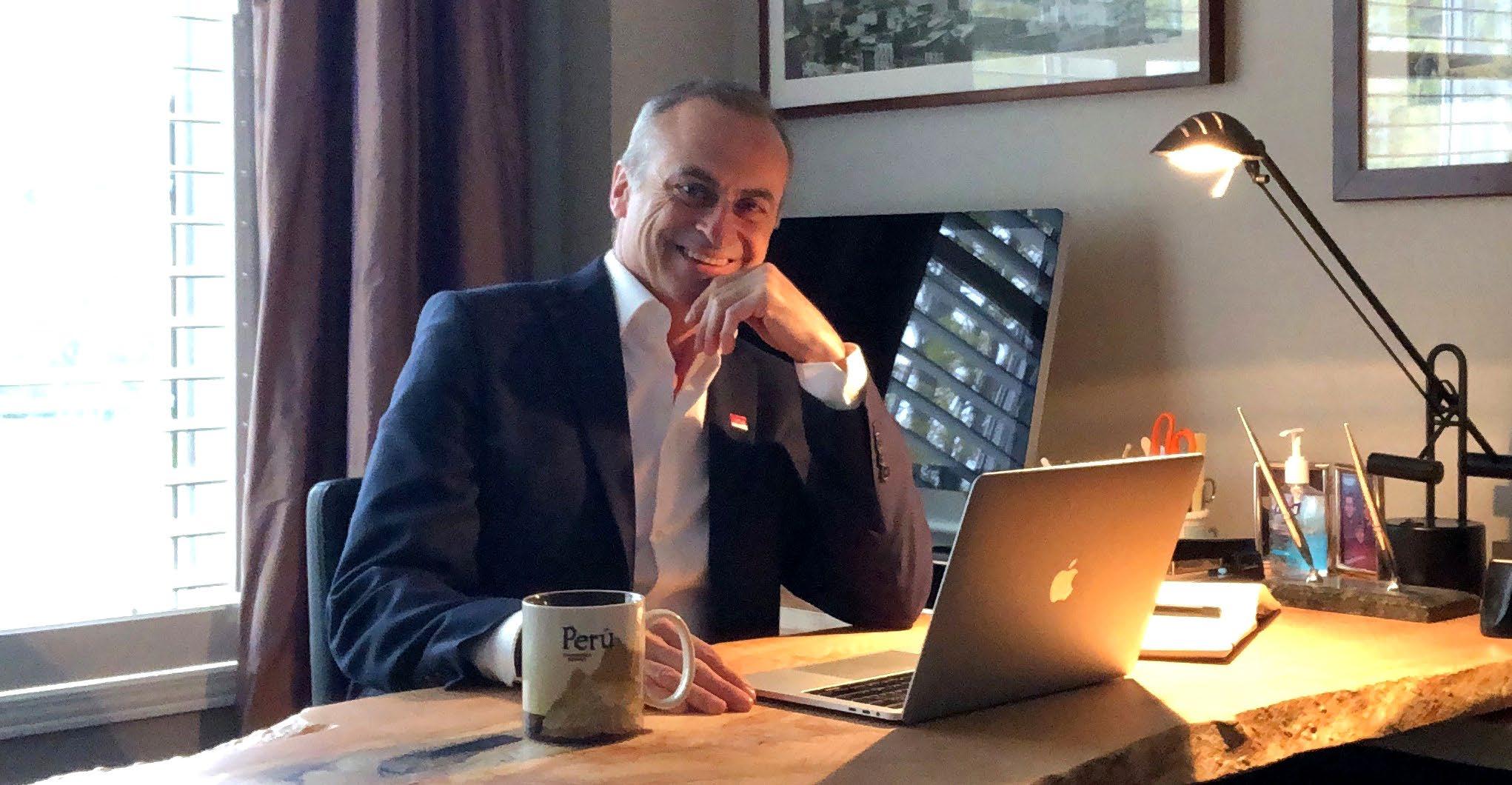
12 minute read
Calculated success: MAcc program turns 20
THE MASTER OF ACCOUNTANCY CELEBRATING 20 YEARS OF THE GOODMAN GRADUATE PROGARAM CALCULATED SUCCESS: MAcc PROGRAM T here’s a surefire way to get Stephen McCourt (BAcc ’99, MAcc ’01) to notice a resumé when applying for a job at RSM Canada’s Toronto offices. Mention your accounting degree is from Brock University’s Goodman School of Business, and you’ll pique the interest of the partner at one of North America’s largest independent audit, tax and consulting firms. “There’s no doubt for me when I see that, I’m going to dig a little deeper into that resumé,” McCourt said. “It’s definitely a differentiator in the pile for me.” That’s because McCourt, himself, is a Goodman
New faculty bring fresh perspectives TURNS 20 CPA invests in Goodman Double Degree celebrates milestone Accounting Co-op alumnus. More notably, though, he was also one of the first students to enrol in and graduate from the School’s Master of Accountancy (MAcc) program when it launched 20 years ago last winter. Pursuing a graduate degree in accounting wasn’t a requirement of the profession at the time. But McCourt had
Advertisement
By Tiffany Mayer a passion for numbers, higher learning — he was considering pursuing his PhD — and especially for Brock.
“I already had a strong affinity for Brock and enjoyed my time in the undergraduate program. I really valued what it did for my personal and professional development,” McCourt said. “There was an element of loyalty and excitement to continue on the journey that I was already on. I also had the full support of my employer. This support and loyalty has led me to now being a partner at the same firm that I articled with as a co-op student at Brock.”
Still, it was a bit of a risk. Brock, which had been known as a primarily undergraduate university at the time, didn’t yet have a reputation for graduate programs. And with the MAcc being the first one offered by what was then Brock’s Faculty of Business, these truly were untested waters.
McCourt, who had been working in the finance department at Queen’s University before returning to school in January 2000, got a scholarship, and with it, the chance to teach.
As one of the first students, McCourt also had the opportunity to help shape the program for future classes. For a guy in his early 20s, it all added up to the ideal situation for putting his career on pause to pursue another degree.
A nudge from the founding professors of the program didn’t hurt either. Both Linda Stillabower and Barbara Sainty taught McCourt during his undergraduate degree. He would have them again as they taught that first cohort of 12 master’s students.
“They reinforced the decision for me. They told me it was a good opportunity for me and a good opportunity to learn,” McCourt said. “I knew (Linda) was one of the two professors instrumental in establishing the program. Linda Stillabower really went above and beyond and invested in me personally and I really valued that. So, I wanted to continue my journey with her. I felt she was my advocate and champion and she would push me and challenge me to be better.”
She did, but it took some serious planning and strategizing to get the MAcc in place to begin with. Stillabower was hired as an accounting professor at Brock in 1993. She was determined there would be a day when her students would include those at the graduate level.
Three years later, she sat on a committee that included fellow accounting professor Ian Adamson and others invested in launching a Master of Accountancy program. Together, their mission was to get the proverbial green light from both the University and the province to launch the year-long program. Stillabower had a hand in creating two master’s programs previously — one at the University of Toronto and another at Case Western University in Ohio — so she knew the work that was required.
At Brock, that included developing an integrated curriculum, a concept that was ahead of the curve but would bode well for the School later when its MAcc was certified as a Chartered Professional Accountants of Ontario (CPA) pathway program in 2013. It would be the first to be accredited in Ontario and become a flagship for Goodman in the process. The MAcc also blazed a trail for other business graduate programs at Brock, including the Master of Business Administration (MBA), Master of Science in Management (MSc), and certificate and double degree programs that followed.
But in 2000, four years after the committee was struck to establish a graduate program in accounting, after much negotiation and many sales pitches, Stillabower wasn’t thinking about any of that as she stood in front of a dozen students — most of them Brock graduates. Instead, she was marvelling at the inaugural class and trying to keep tears in check.
“We knew them quite well and we worked their butts off,” said Stillabower, who still teaches in the program. “That first day of orientation, I could barely believe it without crying. The last class, everybody cried — Barbara (Sainty), too. That first year was really intense.”
Sainty, who had come to Brock from Western University’s Ivey School of Business specifically to teach at the graduate level was giddy with excitement. Together, she and Stillabower taught integration and analysis, which examined accounting’s widespread role in more than just number crunching and bottom lines.
Students were assigned a novel to read over summer and then asked how they would apply it to a business setting, for example. One read Harry Potter and tied it to playing to individual strengths.
“We challenged the students, we read articles, we had class discussions,” Sainty said. “It wasn’t about teaching content. It was about how to be a better person and accountant with all that was going on in the world.
“Brock and Linda were ahead of the time recognizing this was critical to the profession,” she added. “We were the first graduate program in Ontario to be fully accredited (by CPA Ontario) because of that. It made the pathway easier and we were much more ready to teach it. Other universities had to redesign their programs, but we were already 75 per cent there with how we were teaching the MAcc program.”
In those early days when McCourt was part of the original cohort and it wasn’t a pathway to a professional designation, the program was a lesson in discipline and dedication. McCourt remembered a routine of being at school from morning to night that year, going home to sleep and getting up to do it all over again the next day. The payoff was a more confident version of himself — someone with strong communication and presentation skills, and the ability to think on his feet and outside
ORIGINAL CLASS


10-YEAR REUNION
The first Master of Accountancy class, circa 2001.
their class photo at a reunion celebration on Jan. 28, 2012. Back row, from left, Brian Cardinal (MAcc ’01), James Moore (BAdmin ’89, MAcc ’01), Shari (Leitch) Sekel (BAcc ’99, MAcc ’01) and Stephen McCourt (BAcc ’99, MAcc ’01). Middle row, from left, Patricia Brown (BBA ’98, MAcc ’01), Yuqing Wang (MAcc ’01), Rosaria (Zompanti) Cross (BAcc ’00, MAcc ’01) and Norma (St. Pierre) Sierra-Vasquez (MAcc ’02). Front row, from left, Steven (Keith) Herring (BAcc ’00, MAcc ’01), Christopher Brown (BAcc ’00,
Seven of the first Master of Accountancy graduates recreated MAcc ’01) and Leo Borgatti (BAcc ’99, MAcc ’01).
Standing, from left, Brian Cardinal (MAcc ’01), James Moore (BAdmin ’89, MAcc ’01), Shari (Leitch) Sekel (BAcc ’99, MAcc ’01) and Stephen McCourt (BAcc ’99, MAcc ’01). Seated, from left, Steven (Keith) Herring (BAcc ’00, MAcc ’01), Christopher Brown (BAcc ’00, MAcc ’01) and Leo Borgatti (BAcc ’99, MAcc ’01).
the proverbial box.
He also learned to consider issues and challenges from a variety of perspectives.
“Very quickly I realized I had to be all in,” he recalled. “There was lots of dialogue in all sessions. You had to be prepared. There was a bonding and accountability that happened in that group and it was intense. There was no shortage of work to be done.”
And soon after, some of that work was done by international students when Brock expanded MAcc recruitment efforts oversees.
Richard Ye (MAcc ’01) arrived in St. Catharines from Shanghai by leap of faith in the fall of 2000 to study in a program so new, it hadn’t yet had time to carve out any kind of reputation. That didn’t matter because, as Ye recalled, everything he would experience in St. Catharines and Brock was new to him. He was just keen to partake in a popular right of passage among young Chinese business people: go abroad and see how things are done elsewhere.
Ye had already spent three years working for Ernst & Young in China so coming to Canada to study was the ideal opportunity for personal and professional advancement.
“The Canadian accounting standards are very solid and superior in the accounting world,” Ye said. “In China back then, three credentials were very famous: AICPA in the
U.S. and the ACCA in the U.K. The third one is Canadian and it was the CGA. It wasn’t the biggest body in Canada (at the time), but these three were very recognizable in the Chinese market. If you held international credentials, you were very marketable.”
Ye spent his first three months polishing his English before joining the second cohort of the MAcc program in January 2001. In addition to language barriers, he had to overcome culture shock, getting used to the Canadian way of life — everything from eating to studying — as quickly as possible. To help, Ye had a homestay living arrangement.
Like McCourt, sleep was at a premium for Ye once the program started. He’d attend class, go out with his classmates afterward for the Canadian student experience, then head home to study until the wee hours of the morning.
“We are a very hardworking people so to catch up on language, school and culture, the way to do that is to cut down on sleeping time,” Ye recalled.
During Ye’s waking hours, the MAcc program taught him to apply his accounting knowledge to Canadian business. Students were able to “get into the weeds” of business and tax law.
“It’s not like a lecture. It’s case studies and it helps you a lot,” Ye said. “Undergrad is more like teaching textbook concepts. This was more applied. It’s more executive-style training, which was helping me a lot to develop for my future.”
That future included staying in Canada, having both his family and career here. His academic achievements and previous work experience helped him secure a job with an accounting firm before graduating from the MAcc program.
Today he’s the Director of Treasury at Maple Leaf Foods and a proud Goodman alumnus. Ye, who found the homestay experience as invaluable as his academic one, also remains in touch with the woman he lived with as a student.
“Brock University itself is a small university but when you’re talking about the business program and the accounting program, it’s very strong. The graduates were getting jobs very fast,” Ye said. “If you google the program, you will know the difference. Brock is an accounting school.”
The growth in applications to Goodman’s MAcc and other graduate program over the years is proof of that, noted Carrie Kelly, Goodman’s Director of Graduate Programs.
When Kelly started at Goodman six years ago, she would see about 1,100 graduate program applications a year. That number has since climbed to almost 1,700 applications for one of about 400 spaces.
Given the MAcc is a pathway to earning the CPA designation today, the program holds even greater allure than when it originated in 2000. It allows students to earn the professional certification in less time than those balancing an accounting job with CPA exam preparations.
Goodman’s MAcc graduates also have a high success rate on the CPA exam, Kelly explained.
Today, a large number of students come from overseas, much like Ye did all those years ago, to study at Goodman in all of its graduate programs. “We go to (recruitment) fairs in India and parents will come and say ‘My son’s there right now. We just wanted to come meet you and my other son’s interested in coming to Brock as well,’ ” Kelly said. “Even though recruitment is throughout the world, it feels like a small world.”
Especially when McCourt sees Brock University and the Goodman School of Business on a CV. He credits his MAcc degree with helping him get to where he is in the accounting world today, including hiring the best and the brightest accountants in the country.
“The skills I developed in that program have helped me in my career,” McCourt said. “Without a doubt, it was the best decision I ever made.”
BROCK SIGNS AGREEMENT FOR CHINESE NATIONALS TO STUDY MASTER OF ACCOUNTANCY

Martin Kusy, Professor of Operations and former Dean of the Faculty of Business, and Yan Yumin of Shanghai Foreign Service Corporation shake hands in January 2000 after signing an agreement that allowed qualified Chinese nationals to pursue graduate studies in the Master of Accountancy program.
RIBBON CUTTING CEREMONY FOR FIRST INTERNATIONAL COHORT OF MASTER OF ACCOUNTANCY PROGRAM

Martin Kusy, Professor of Operations and former Dean of the Faculty of Business, front left, is joined by Andy Panko, former Vice-Chair of Brock’s Board of Trustees, and Eddie Wu of the Shanghai Foreign Service Corporation at an official ribbon cutting in October 2000 to mark the start of the first cohort of international students enrolled in the Master of Accountancy (MAcc) program. Standing in the background are Brock’s first MAcc international students: All were professionals from accounting firms and multinational businesses in Shanghai, China when they started the program in October 2000.
Students, front row, from left, Xiaoyue (Carol) Pan (MAcc ’01), Weiyin (Vivian) Shen (MAcc ’01), Yuhong (Carol) Qian (MAcc ’01), Yonghui (Claire) Shen (MAcc ’01), Ying (Emily) Jiang (MAcc ’02) and Jun (Jackie) Qian (MAcc ’01). Students, second row, from left, Zhizhong (Richard) Ye (MAcc ’01), Wei (Vivian) Chen, Wei (Grace) Chen (MAcc ’01), Yinhao (Stella) Hu, Junqing (Cynthia) Qui (MAcc ’01), Wen (Ellen) Wang (MAcc ’02), Limin (Amanda) Xing (MAcc ’01), Lili (Lily) Sun (MAcc ’01, BSc ’06), Fanxi (Fiona) Kong (MAcc ’01) and Lili (Lily) Gao. Absent: Zhengmin (Jessie) Zhou (MAcc ’01).









